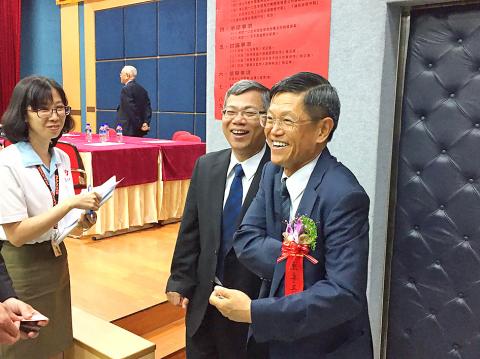Tire manufacturer Kenda Rubber Industrial Co (建大輪胎) yesterday launched its new plant in Yunlin County’s Douliou City (斗六) as part of its efforts to improve operating efficiency.
The new facility, which cost nearly NT$200 million (US$6.61 million), is to serve as its logistic center in the nation and a production site to jig fixtures for tires, the company said.
Kenda supplies tires for cars, motorcycles and bicycles, with revenue breakdown by product last year being about 38 percent for sedans, 28 percent for motorcycles, 22 percent for bicycles and 12 percent for other types of tires, according to data compiled by First Capital Management Inc (第一金證券投顧).

Photo: CNA
The Yuanlin Township (員林), Changhua County-based company reported NT$12.5 billion in cumulative sales in the first five months of the year, slipping 0.61 percent from the previous year, company data showed.
Kenda, which raised prices in April, said higher product prices made its customers hesitant to place orders, adding pressure to its top-line growth.
However, Kenda vice chairman Jimmy Yang (楊啟仁) voiced optimism about the company’s business outlook, saying that revenue is likely to grow in the second half, following surging demand for bike-sharing services in China.
“The demand for our bike tires has been increasing since the second half of last year, thanks to China’s recent bike-sharing boom,” Yang told reporters in Yuanlin on Wednesday.
Kenda counts Ofo Inc (共享單車) and Mobike Technology Co Ltd (摩拜科技) — the top two bike-sharing service providers in China — among its major clients, Yang said.
Ofo is expected to purchase 10 million bikes for its bike-sharing business this year, while Mobike is to add nearly 7 million bikes, Kenda said.
As a result, Kenda has set a sales target of 5.4 million tires this year, which translates into a 10 percent increase from the previous year, the company said.
Driven by significant demand, Kenda’s daily output of bike tires has grown from several thousand to 50,000.
The company produces most of its bike tires in Kunshan and Tianjin in China.
To expand its market presence in Southeast Asia, Kenda is constructing a new plant in Vietnam to manufacture car tires, which is expected to start pilot production in the fourth quarter.
Kenda shareholders yesterday approved a proposal to pay cash dividends of NT$2 per share, based on last year’s net profit of NT$3.09 billion, or NT$3.54 per share.
Last year, the tire maker saw its earnings fall 10.8 percent from the previous year, while sales dropped 5.4 percent annually to NT$29.5 billion, primarily due to slowing customer demand and the sharp appreciation of the New Taiwan dollar in the fourth quarter.
In related news, Cheng Shin Rubber Industry Co (正新橡膠), another top player in Taiwan’s tire manufacturing industry, yesterday approved a plan to pay cash dividends of NT$3 per share, based on last year’s earnings of NT$13.25 billion, or earnings of NT$4.09 per share.
Cheng Shin, which sells its products under the Maxxis brand, said it expects annual sales to reach NT$200 billion in 10 years, compared with last year’s NT$117.4 billion, backed by capacity expansions at its new plants in Indonesia and India.

Meta Platforms Inc offered US$100 million bonuses to OpenAI employees in an unsuccessful bid to poach the ChatGPT maker’s talent and strengthen its own generative artificial intelligence (AI) teams, OpenAI CEO Sam Altman has said. Facebook’s parent company — a competitor of OpenAI — also offered “giant” annual salaries exceeding US$100 million to OpenAI staffers, Altman said in an interview on the Uncapped with Jack Altman podcast released on Tuesday. “It is crazy,” Sam Altman told his brother Jack in the interview. “I’m really happy that at least so far none of our best people have decided to take them

BYPASSING CHINA TARIFFS: In the first five months of this year, Foxconn sent US$4.4bn of iPhones to the US from India, compared with US$3.7bn in the whole of last year Nearly all the iPhones exported by Foxconn Technology Group (富士康科技集團) from India went to the US between March and last month, customs data showed, far above last year’s average of 50 percent and a clear sign of Apple Inc’s efforts to bypass high US tariffs imposed on China. The numbers, being reported by Reuters for the first time, show that Apple has realigned its India exports to almost exclusively serve the US market, when previously the devices were more widely distributed to nations including the Netherlands and the Czech Republic. During March to last month, Foxconn, known as Hon Hai Precision Industry

PLANS: MSI is also planning to upgrade its service center in the Netherlands Micro-Star International Co (MSI, 微星) yesterday said it plans to set up a server assembly line at its Poland service center this year at the earliest. The computer and peripherals manufacturer expects that the new server assembly line would shorten transportation times in shipments to European countries, a company spokesperson told the Taipei Times by telephone. MSI manufactures motherboards, graphics cards, notebook computers, servers, optical storage devices and communication devices. The company operates plants in Taiwan and China, and runs a global network of service centers. The company is also considering upgrading its service center in the Netherlands into a

Taiwan’s property market is entering a freeze, with mortgage activity across the nation’s six largest cities plummeting in the first quarter, H&B Realty Co (住商不動產) said yesterday, citing mounting pressure on housing demand amid tighter lending rules and regulatory curbs. Mortgage applications in Taipei, New Taipei City, Taoyuan, Taichung, Tainan and Kaohsiung totaled 28,078 from January to March, a sharp 36.3 percent decline from 44,082 in the same period last year, the nation’s largest real-estate brokerage by franchise said, citing data from the Joint Credit Information Center (JCIC, 聯徵中心). “The simultaneous decline across all six cities reflects just how drastically the market